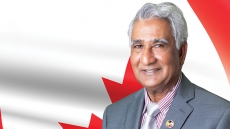Recently inducted into the Canadian Medical Hall of Fame, Cardiac expert Dr. Naranjan Dhalla has been diligently working in the field of Experimental Cardiology with a focus on pathophysiology and pharmacology of cardiac dysfunction.
Born in a very loving family in India, Dr. Naranjan Dhalla inherited the qualities of kindness and compassion very early in life. Being the eldest son among seven siblings, he grew up receiving attention and understanding responsibility. His role model was his father, a businessman who was always concerned about the wellbeing of his entire village in Punjab. The 82-year-old admits, “I could never match the substance and style of my father. He was a man of great ethics and high standards, too nice a person.”

Growing up, Dr. Dhalla wanted to be a movie director. In all his innocence he says, “I found out during my college days, that I was neither a good student nor a great athlete. I had nothing unique in me. By being a movie director I thought I would be doing something useful. Since India had just got its independence, there were a lot of problems. I hoped to help resolve religious, social and cultural conflicts. But readily I realized I did not have appropriate contacts to make that happen. I instead became involved with medical research seeing the extraordinary opportunities for discovering new drugs and relieving ailing patients.”
After his graduation from the Khalsa College of Panjab University, Dr. Dhalla volunteered in a laboratory in Amritsar. Soon he got hired as a chemist at the Department of Pharmacology in Lady Hardinge Medical College. He moved to New Delhi, to work towards finding how herbs can be utilized as ingredients in medicines. That’s where he left his first lasting impression. “It was challenging, but I got lucky and learnt some great cardiovascular technics,” says the humble professor.

Two prominent individuals took notice and advised this talented young man to pursue his masters at their very-reputed institutions. Dr. Naranjan Dhalla quotes with pride, “I got a letter of acceptance from both, the University of Pennsylvania and the University of Toronto. I simply picked the first one to give me the opportunity.” Even though he had a degree equivalent to a Masters in Chemistry from India, he always felt his education was somehow incomplete. “I was identified as having what it takes to be an outstanding scientist. But I was also suggested to gain advanced education in pharmacology.”
Dr. Dhalla left India in 1961 after working in research-related capacities for over four years. After obtaining his MS Degree from the University of Pennsylvania, USA, he went on to complete his PhD at the University of Pittsburgh, USA, and then took up his very first faculty position at St. Louis University in Missouri, USA. That’s when a mentor advised him to seek a permanent faculty position to develop his independent research career.
It was in August 1968 that Dr. Naranjan Dhalla moved to Canada to work at the University of Manitoba, the place he’s spent more than 50 years of his professional career. In 1978, it was under Dr. Dhalla’s leadership that the first Centre of Excellence in Cardiovascular Research in Canada by the Medical Research Council of Canada was established in Winnipeg. “I readily developed a strong experimental cardiology research laboratory and a highly viable graduate training program. My own need for additional space and passion for developing a young generation of cardiovascular scientists helped me create the Institute of Cardiovascular Science at St. Boniface Hospital Research Centre in 1987. I consider myself fortunate,” adds Dr. Dhalla, who served as Founding Director of the Institute of Cardiovascular Sciences for 19 years. Dr. Dhalla has been diligently working in the field of Experimental Cardiology with a focus on pathophysiology and pharmacology of cardiac dysfunction. He was one of the first investigators to identify membrane defects during the development of heart disease. He has published 630 research papers in refereed journals and 184 review articles in books and monographs till date; and has trained 163 graduate students, postdoctoral fellows, visiting scientists and BSc Med students in an effort to build a highly skilled manpower in the field of cardiovascular science and medicine.

In view of the superior achievements in research and education, the University of Manitoba appointed Dr. Dhalla as Distinguished Professor in 1991. In his zest to serve the cardiovascular community, he helped develop the International Society of Heart Research for promoting cardiovascular research and exchange of information for 26 years, first as Secretary General and then as President. In 1996, he founded the International Academy of Cardiovascular Sciences for preventing heart disease and promoting cardiovascular education all over the world. Due to his distinguished services, his statue has been installed in the Citizens Hall of Fame in Winnipeg and he has been honoured with Order of Manitoba and Order of Canada. Recently, he has been named to be inducted into the Canadian Medical Hall of Fame.

Alongside, he has been bestowed with multiple accolades. Dr. Dhalla was elected as a Fellow of the Royal Society of Canada and was awarded MD (Hons) degree from the Charles University, Prague, in 1995. He has received Honorary DSc degrees from five academic institutions namely Slovak Academy of Sciences, Bratislava (1997); Panjab University, Chandigarh (2009); Guru Nanak Dev University, Amritsar (2010); University of Kragujevac, Serbia (2014); and University of Argentina, Buenos Aires (2015). In addition, he was awarded Honorary Professorship/Professor Honoris Causa from four different universities of Romania and China.
On being asked what he thinks is the real enemy of the heart, Dr. Dhalla exclaims, “Sustained stress is a lesser-known evil, which will turn out to be the most powerful stimulus for the development of heart disease.” He believes yoga and meditation can be beneficial. Talking about heart disease and its association with the South Asian community in particular, the award-winning cardiac expert believes diabetes, hypertension and an unbalanced diet are the common reasons for ailments among the South Asian population.

